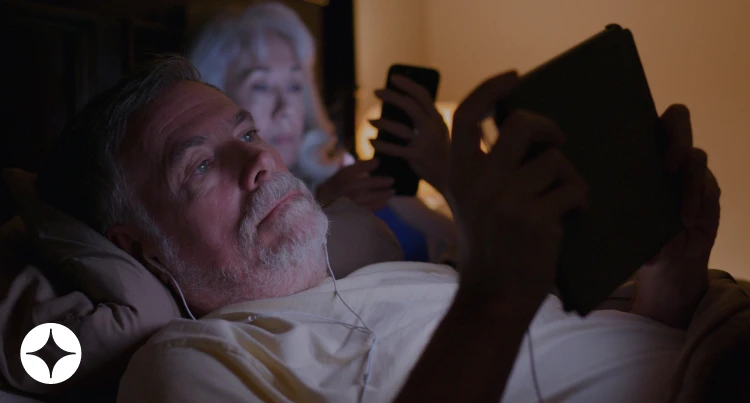
In the delicate dance of our daily lives, one rhythm plays a pivotal role in regulating our sleep-wake cycles: the circadian rhythm. This internal clock is what guides us through the cycles of wakefulness and rest, ensuring our bodies function optimally.
However, in today's digital age, our circadian rhythm is increasingly disrupted by the presence of technology [1]. From the blue light glow of screens to the buzz of notifications, our devices encroach upon our evenings, impeding our ability to unwind and fall into restful slumber. In this blog post, we'll explore the impact of technology on our circadian rhythm and sleep patterns, and discuss strategies for digital detox to reclaim tranquility and prioritize our well-being.
The Influence of Technology on Sleep:
At the heart of our sleep-wake cycles lies the circadian rhythm [2], a finely-tuned system synchronized with the natural rhythms of day and night. Governed by internal cues and external stimuli, this biological clock regulates the release of hormones like melatonin, signaling to our bodies when it's time to sleep and when to wake. However, the intrusion of technology disrupts this delicate balance, particularly through the emission of blue light from screens.
The blue light [3] emitted by smartphones, tablets, and computers suppresses the production of melatonin, the hormone responsible for inducing sleep. Prolonged exposure to this artificial illumination in the hours leading up to bedtime confuses our internal clock, delaying the onset of sleep and fragmenting our rest. When it comes to quality sleep, the importance cannot be understated. Research shows the sleep disruptions caused by blue light may contribute to the causation of cancer, diabetes, heart disease, and obesity. [4] Not to mention, the direct impact on our energy and our ability to navigate our daily activities is unquestionable.
Expert Satchidananda (Satchin) Panda, PhD, a Professor at the Salk Institute in California says "Your day begins with what time you went to bed the previous night."[5] and we couldn't agree more. Now that we understand the importance of quality sleep and how blue light can negatively impact that, here are some ideas for how to start your path to better sleep with a digital detox:
Strategies for Digital Detox:
- Establish Tech-Free Zones: Designate sanctuaries within your home, such as the bedroom, as technology-free havens. By banishing screens from these sacred spaces, you create sanctuaries conducive to relaxation and rejuvenation.
- Set Boundaries: Define clear boundaries for screen time, particularly before bedtime. Aim to disconnect from electronic devices at least an hour prior to sleep, allowing your mind to unwind and transition into a state of serenity.
- Prioritize Sleep Hygiene [6]: Cultivate habits that promote good sleep hygiene, such as maintaining a consistent sleep schedule and creating a calming bedtime routine. Ensure your sleep environment [7] is conducive to rest, with minimal light and noise pollution.
- Embrace Analog Activities: Rediscover the pleasures of analog pursuits that nourish the soul and soothe the mind. Instead of reaching for your smartphone, indulge in activities like reading a book, practicing mindfulness, or engaging in gentle stretches.
- Use Technology Wisely: Harness technology to support, rather than sabotage, your sleep goals. Explore sleep-tracking apps [8] and devices to monitor your sleep patterns and identify areas for improvement. Additionally, leverage apps that filter blue light or offer relaxing sounds to facilitate a tranquil bedtime routine.
- Stay Mindful: Cultivate awareness of your technology usage and its impact on your sleep and overall well-being. Take regular breaks from screens throughout the day, and prioritize activities that promote mental and physical wellness. Learn more about healthy sleep habits in our post "Everything You Need to Know About Sleep Hygiene" [6].
Our circadian clock plays a crucial role in our sleep-wake cycles and sleep quality. The presence of technology threatens to disrupt this natural process, but by embracing digital detox strategies and nurturing our circadian rhythm, we can strive to change our sleep habits improve our sleep quality and ultimately our well-being.
References
- Effects of Light on Human Circadian Rhythms, Sleep and Mood
- National Library of Medicine – Physiology, Circadian Rhythm
- UC Davis Health, Cultivating Health
- Harvard Health, Blue Light Has a Dark Side
- The Proof, 6 Lifestyle Habits That Will Improve Your Health
- SoClean, Everything You Need to Know About Sleep Hygiene
- SoClean, Organize Your Bedroom for Higher Quality Sleep
- SoClean, Top Sleep Apps for Improving your Zzzs




